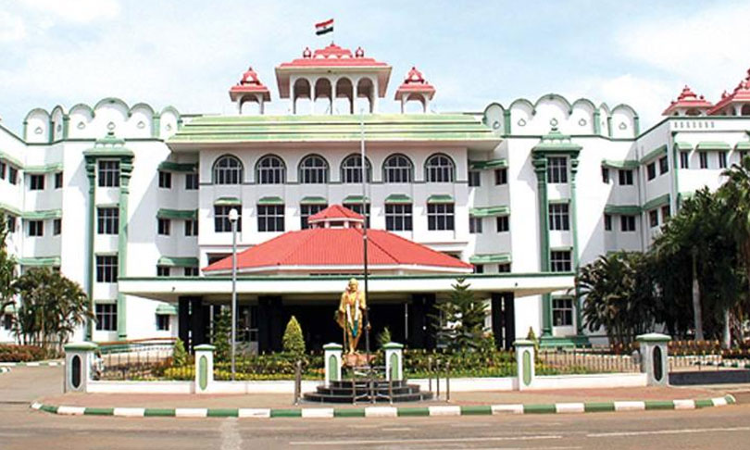- Home
- /
- High Courts
- /
- Madras High Court
- /
- Hindu Marriage Not 'Religious...
Hindu Marriage Not 'Religious Purpose': Madras High Court Quashes GO Permitting Use Of Temple Funds To Construct Marriage Halls
Upasana Sajeev
29 Aug 2025 10:14 AM IST
The Madras High Court has recently quashed a Government Order by which the State had granted permission for the construction of marriage halls by utilising the temple funds belonging to five different temples situated at different places. The bench of Justice SM Subramaniam and Justice G Arul Murugan held that the State's decision was violative of provisions of the Hindu Religious...
The Madras High Court has recently quashed a Government Order by which the State had granted permission for the construction of marriage halls by utilising the temple funds belonging to five different temples situated at different places.
The bench of Justice SM Subramaniam and Justice G Arul Murugan held that the State's decision was violative of provisions of the Hindu Religious and Charitable Endowment Act, 1959 and the Rules and did not fall within the definition of “religious purpose”.
“In view of the discussions made in the aforementioned paragraphs, this Court has no hesitation in arriving a conclusion that the Government decision for construction of marriage halls for the purpose of renting it out for marriage functions is in violation of the provisions of the Act, 1959 and the Rules and does not fall within the definition of “religious purposes”,” the court observed.
The court noted that as per Section 66 of the HR & CE Act, surplus funds could not be diverted for commercial or profit making ventures but must be confined to religious or charitable purpose. The court also noted that Hindu marriages, though considered sacrament, was a union bound by contractual terms and hence could not be considered a religious purpose.
“It is also noteworthy that though Hindu marriages are primarily considered as a sacrament it also carries with it elements of contract. So the principles of Hindu marriage as recognised under the Hindu Marriage Act, 1955 has within its ambit elements of a sacred union, which is bound by contractual terms. Hence Marriage being a sacred union of two individuals cannot in itself constitute a “religious purpose”. Therefore marriage per se cannot be attached to religious purposes,” the court said.
The petitioner had challenged the GOs and submitted that temple funds could not be utilised for commercial purposes and the decision was in violation of Sections 35, 36, and 66 of the Tamil Nadu Hindu Religious and Charitable Endowment Act, 1959. It was also argued that no building plan had been obtained for constructing the marriage halls but still funds had been released.
The Additional Advocate General, on the other hand, argued that performance of Hindu marriages was a religious activity and the decision was taken to assist Hindus to perform marriage with less expenditure. It was argued that construction of marriage halls would fall within construction of building for temple activity and was within the provisions of the Act.
Perusing the GO, the court noted that the marriage halls were not free of charge and were rented out on payment of fee. Thus, the court noted that there was no charity in the object of the GO, and hence, it could not be said to be a religious purpose under the Act.
Highlighting that the scope of provision could not be expanded, the court remarked that the movable and immovable properties, ornaments, jewels etc, donated by devotees/donors to the temple must be used by the temple only for religious purposes and not for any other common purpose. The court thus observed that the state had no authority to divert the funds for any other purpose under the name of religion which would defeat the objective of the Act.
“Temple funds are collected from and out of the donations offered by the devotees, donors and from immovable properties gifted in favour of the deity/Temple only for religious purposes or to celebrate temple festivals in temples or to utilize the funds for maintenance and development of temple or group of temples as the case may be. Thus, temple funds cannot be treated as public funds or the Government funds. Temple funds are exclusive contribution of the Hindu religious people on account of their emotional or spiritual attachment with the temples or with the deities or with the Hindu religious customs, practices or ideologies etc,” the court observed.
The court added that if the scope of the provision was expanded and the temple fund was used for any other purpose, it would lead to misuse, abuse or misutilisation of temple funds and would infringe the rights of Hindu devotees.
“Expanding the scope of interpretation of the Act or Rules other than the religious purposes is null and void. Any such interpretation will lead to misuse, abuse or misutilization of temple funds, and would infringe the religious rights of the Hindu devotees / donors, who have contributed their hard-earned money for the development, maintenance and welfare of the temple, its devotees and deity,” the court said.
The court also noted that the role of the Government, while controlling the affairs of the temples across the State, was only to prevent abuse, misutilisation or misappropriation of temple funds and its properties.
Thus, noting that the state had not followed the procedure contemplated under Utilisation of Surplus Funds Rules or obtained building permit, the court quashed the GO.
Counsel for Petitioner: Mr. R M.Arun Swaminathan
Counsel for Respondents: Mr. Veera Kathiravan Additional Advocate General Assisted by Mr.P.Subbaraj Special Government Pleader, Mr.V.Chandra Sekar, Mr.A.K.Sriram Senior Counsel for Mr.R.Murali
Case Title: Rama Ravikumar v. The State of Tamil Nadu and Others
Citation: 2025 LiveLaw (Mad) 290
Case No: W.P(MD)Nos. 5893, 15498, 17666, 21966 & 21967 of 2025



